The agricultural landscape is changing like never before, in terms of policy, economics, environment, farming systems, food security and more. This year, the Cereals AHDB Theatre is themed ‘Code Green for Farming’ and will bring farmers bang up to date with the latest thinking on how to produce food sustainably.
Whether it’s making the environment pay, finding security amid global uncertainty, or transitioning to a new farming system, experts will be on hand to give farmers the answers they need to run a successful business.
The seminars will run across the two days of Cereals – 8-9 June, with a full programme of unique sessions on each day.
In the session, Climate change – adapting for financial success, sponsored by terravesta, Dr Jon Foot, head of environment and resource management at AHDB will discuss environmental risk. “This is partly connected to climate change but also changes in nitrogen regulations, he says.
“Farmers need to prepare for these changes and understand the options to reduce their carbon footprint. Carbon is money and goes hand in hand with greater efficiency and productivity.”
Global events have focussed the industry’s need to tackle high fuel and fertiliser prices by optimising production to ensure a profitable return, he adds.
In a session looking at whether the incoming co-designed farming grant schemes are going to help or hinder farmers, Emily Norton, director of research at Savills, will seek answers from industry experts.
“We need to make sure farm businesses are protected from a pure focus on environmental land management. We should be talking agricultural policy not environmental policy and making sure those messages get through to government,” she says.
Looking at food security, the government has delayed its response to the Food Strategy document and needs to grapple with the twin problems of rising cost of food production and consumers being squeezed and not able to afford food, she says.
“We can’t sustain a society on cheap food when the core factors that sustain food production are at risk.
“For farmers, it is about how they act in a responsible way to the crisis – not by chasing yield and ever diminishing returns in making food cheaper, but instead in playing the long game, developing sustainable and environmentally beneficial systems. The ask to policymakers to support this transition is clear.”
One farmer who has sought to develop more sustainable systems is Ian Piggot OBE, who will take part in a panel session looking at the practical aspects of regenerative farming.
Managing partner at Thrales End Farm, near Harpenden, Mr Piggot began his journey around seven years ago. “We recognised that our soils were degrading under intensive cultivation and excessive use of fertilisers and sprays – we needed to make a significant step change in the way we approached growing crops,” he says.
“With a reduction in farm support on the horizon we also needed to find a way of driving costs out of our business. Diesel was almost an insignificant cost when we started with regenerative farming – now it is five times the price it was.”
The closing session will focus on the latest technology to help farmers farm more sustainably and profitably. Dr Jenna Ross, international business development manager at CHAP, will speak about autonomous slug monitoring and precision bio-molluscicide treatment, helping to boost a very limited slug control toolbox.
“This kind of technology could potentially be used to control any pest or disease and speaking about it at Cereals will encourage visitors to think about other possible applications.”
- The Cereals Event will be held near Duxford, Cambridgeshire on 8-9 June 2022. For more information or to purchase tickets visit the relaunched website www.cerealsevent.co.uk.





